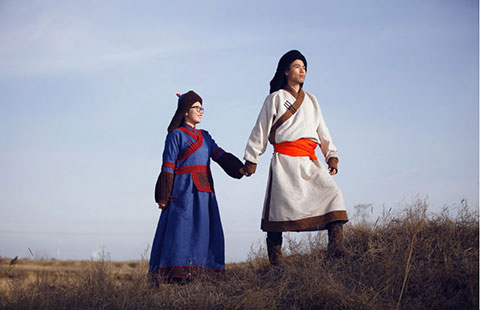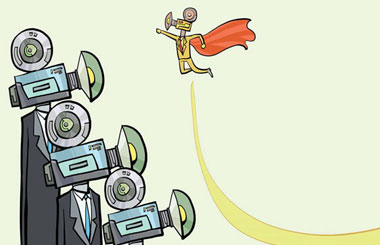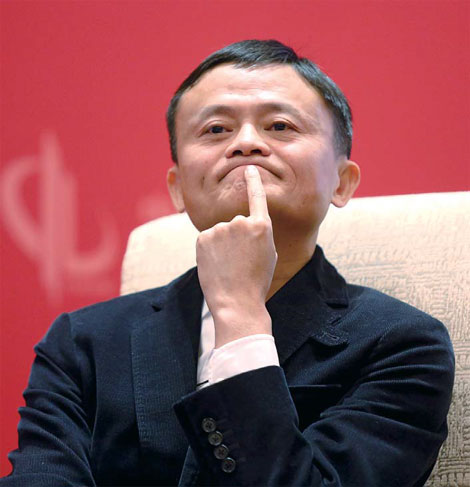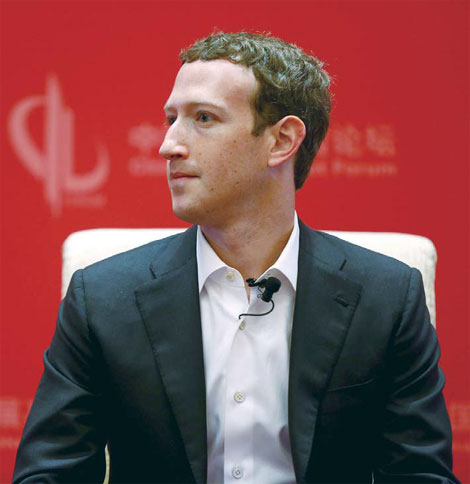Tech titans talk of men and machines
Updated: 2016-04-01 08:31
By Ma Si(China Daily Europe)
|
|||||||||
Jack Ma and Mark Zuckerberg share their thoughts on innovation, culture and philosophy
What does AlphaGo's recent victory over a world champion player of the ancient strategy game Go mean to Alibaba Group Executive Chairman Jack Ma and Facebook CEO Mark Zuckerberg?
"Computers will be able to process the world and understand senses like vision and hearing better than people over the next five to 10 years," Zuckerberg, 31, told an audience at a recent forum in Beijing.
|
Jack Ma, executive chairman of Alibaba Group Holding Ltd. |
|
Mark Zuckerberg, Facebook founder and CEO. Photos by Reuters |
But Ma, 51, disagreed.
"Machines will be stronger and smarter than human beings, but they will never be wiser," he said.
Below are edited excerpts of a talk with the two Internet moguls, moderated by Qian Yingyi, dean of the School of Economics and Management at Tsinghua University.
Qian: A major theme of the 13th Five-Year Plan (2016-20) is innovation. What is innovation from your perspective?
Zuckerberg: I think it's to look out for five to 10 years to see what problems exist that you can take on over a long period of time.
At Facebook, we focus on three sets of problems we want to solve.
The first is to have every person in the world have Internet. Today, with 7 billion people in the world, there are still more than 4 billion not (connected).
The second focus is artificial intelligence. We will have computers that can process the world and understand senses of vision and dreams better than people. Computers may not be smarter than we are, but there will be a lot of progress in 10 years.
The third area is building the next computing platform based on virtual reality.
Qian: AI has attracted worldwide attention with the Go game, a game that originated in China. What is your take on this event? What is the future of AI?
Zuckerberg: When we see these milestones of AI, we tend to think that we are very close to having general computing intelligence that can solve any problem. But the reality is that we have one really big trick, which is large pattern recognition.
The thing that makes humans unique is common sense or the ability to learn in one domain and then have it applied to another to solve a problem. So you have got a computer that can play Go, but that doesn't help that computer solve other problems in other places.
Ma: Machines will be stronger and smarter. But a machine can never be as wise as human beings. So I don't think we should be scared about machines. Instead, we should use machines as an innovative, effective way to solve problems.
Qian: How do you see the future of virtual reality?
Zuckerberg: The idea is that VR can produce an immersive, 360-degree digital experience.
VR is really helpful for entertainment, education and helping people simulate different environments. I think 2016 will be a really good year for VR to start to ship. In the beginning, the market is small and it will be five to 10 years before it becomes a really big thing.
Ma: I remember when I started my Internet business in 1994, I had no idea of what Internet was. What I was thinking was how this tech would help others do things easier. When I think of VR, I ponder how the technology can make it easier to shop on our site and how can it help people better sell online.
Qian: What is the most surprising innovation you've seen? What technology will change the world?
Zuckerberg: Google's AlphaGo is the most surprising innovation I have seen this year.
I got really excited about self-driving cars because they will save a lot of people's lives. I also look forward to the application of AI in the science of health.
Ma: I think there will be a big breakthrough in life sciences in the next 20 to 30 years. People will live longer and healthier with the help of computing and data. In the past 300 years, science was so fast and people made great progress in understanding the outside world, but we know so little about ourselves.
Qian: Since both of you are bicultural, what are the differences between the two cultures in terms of innovation?
Zuckerberg: One thing on which I'm optimistic about China is its emphasis on engineers. More of the jobs that we see everywhere are increasingly technical. When you look at the government here, lot of folks in government are engineers. The mindset of problem-solving comes from discipline.
Ma: I once had a discussion with one of my best American friends. He said, Jack, I worry about China, because in 20 years, China's GDP will be bigger than that of the United States.
The religion of the Western world is very competitive. They need a competitor. Either you are on my side or you are on the other side. But in China we are different. The religions of China - Taoism, Buddhism and Confucianism - are all about being harmonious. So who will win? I believe people who can blend the two cultures will win.
Qian: Any advice for those who want to become entrepreneurs?
Zuckerberg: You should focus on solving a problem rather than starting a company. In Silicon Valley, a lot of people start a company before they know what problem they want to solve. That is crazy. When you find your mission and have someone actually like it and use it, you will find employees to push it further to the world.
Ma: My advice is that you have to believe in what you are doing. You have a mission, you want to solve a problem and you believe it. You do it not because the others are doing it. You do it not because this thing is going to make money.
masi@chinadaily.com.cn
(China Daily European Weekly 04/01/2016 page31)
Today's Top News
A fresh start
Bookshops reinvent themselves
Xi-Obama bilateral talk to advance ties
Foreign companies reassured on new Internet rules
Beijing and Prague form new key link
Trump drops pledge to back Republican nominee
China, Czech Republic set up strategic partnership
EgyptAir hijacker arrested, all passengers freed
Hot Topics
Lunar probe , China growth forecasts, Emission rules get tougher, China seen through 'colored lens', International board,
Editor's Picks

|

|

|

|

|

|








